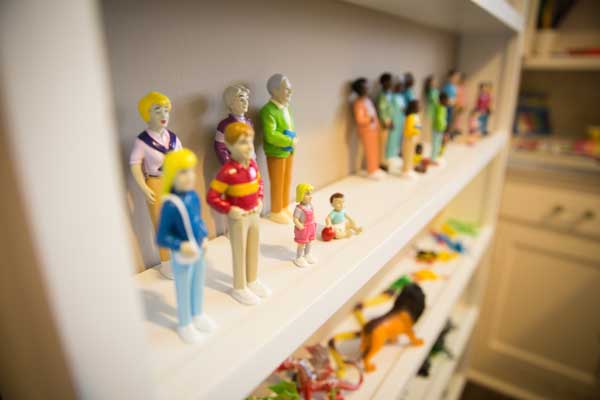“As a Christian, one of the things I admire about Christ is He spent a lot of time hanging out with people who were very different than Him, and people who have very different values,” said Justin Briggs, professor and clinical director.
And that’s exactly what the new therapy center is doing — reaching out to all of the Nashville community, regardless of circumstances, lifestyle and religion.
“The people who are walking through our doors aren’t all students — they aren’t all even associated with Lipscomb,” Briggs said. “We’re having believers, non-believers, old, young, gay, straight — we’re serving everybody, and we want to serve everybody.”
It’s another important way that the university is reaching out to help the Nashville community.
The therapy center is a little over a month old, and is in a renovated home on the corner of Granny White Pike and Mayfair Avenue. It’s not just the clients that walk through the door who make it different from any other college family therapy center — it’s also the students who are being trained, hands-on, to be therapists.
Most of the therapists working at the center are graduate students in Lipscomb’s marriage and family therapy program.
“Our students are learning how to diagnose mental-health disorders,” he said. “And we learn how to treat those in the context of individuals, couples and families, so we look at what’s going on in the lives of the individual; but we’re also trying to assess and to look for maybe some biological issues that are causing somebody to be depressed or have a mental disorder.”
The center uses systemic thinking — the science used to make behavioral inferences based on a person’s environment — to assess each situation. The program includes around 40 students and requires each student to have a certain number of face-to-face client-contact hours. Every week each student is involved in at least two hours of supervision.
“We help them formulate their treatment plans, and we help them learn how to think about the cases and ways that are going to benefit the clients most. Because our No. 1 priority, when it comes to really anything in this program, is client care.”
Briggs said that working with graduate students is just one of the highlights of his job, because he sees how they’re impacting the lives of others.
“One of my favorite parts of this job is supervision, because I get to see these talented people working and learning, and they’re all pretty eager to learn.”
Briggs shared stories from when he got his start in the therapy field, and added that the job can be difficult, but learning the true focus is key.
“We tell our students all the time — focus on the work, not the results.”
And because therapy is conducted by mostly students, the pricing structure is unique.
For every $10,000 a person earns in a year, they will pay $10 per hour of therapy service at Lipscomb’s center.
“Because we have that payment structure, we’re already making an impact, because people who don’t have access to mental health and relationship care now have it.”
That hourly charge caps out at $50 for those clients who are coming from partnerships — which is the No. 1 source of clients along with word-of-mouth advertising, according to Briggs. The partnerships are simply referring patients to the center.
While Lipscomb’s therapy center is doing more marketing and generating partnerships now, it already has 11 partnerships, including The Well, Agape Counseling Center, Refuge Center for Counseling and the Tennessee Prison Outreach Ministry.
Briggs said that with more partnerships, the center will be able to serve more people — which will be a joy.
“We think it’s great to serve students on campus,” he said. “We also think it’s great to serve the general public and to be developing relationships with people the school hasn’t had relationships with.”
It’s not just the joy that comes from serving that drives Briggs, it’s also teaching his students how to use the tools to success as therapists.
“In relationships we know that it’s more about trying to understand one another than it is actually coming to agreement on things,” Briggs said. “That’s why I’m so big on tolerance, which is being meaningful, loving and caring in a relationship with people who are different from you.”

